 YOG kicks off in Nanjing
YOG kicks off in Nanjing
 Colorful life at Youth Olympic Village of Nanjing 2014 YOG
Colorful life at Youth Olympic Village of Nanjing 2014 YOG
 Royal Taoist temple to open to public
Royal Taoist temple to open to public
 Female soldiers at quake-hit area
Female soldiers at quake-hit area
 Shocking photos of cruel battles in Ukraine
Shocking photos of cruel battles in Ukraine
 Amphibious armored vehicle unit conducts open sea drill
Amphibious armored vehicle unit conducts open sea drill
 Water relay in Henan
Water relay in Henan
 Ethnic culture feasts eyes of travelers
Ethnic culture feasts eyes of travelers
 80 security dogs assembled in Nanjing police dog training base
80 security dogs assembled in Nanjing police dog training base
 Graffiti artists paint on street walls in Xinjiang
Graffiti artists paint on street walls in Xinjiang
BEIJING, Aug. 19 -- Since Xi Jinping made his first trip as China's leader to Shenzhen, symbolic hub of Deng Xiaoping's reforms, similarities between the two statesmen have grown, despite the years which separate them.
On the eve of the 110th anniversary of Deng's birth which falls on Friday, China is holding a series of activities to celebrate the late leader's life, and rethinks how to push forward reforms across a society with far more diverse and conflicting interests than 30-odd years ago.
THE FUTURE IS NOW
On Monday, Xi vowed to promote the reform with "real guns and real knives", a phrase that stresses determined and concrete steps to achieve a certain goal.
In 2014, the first year for China's grand reforms, there should be a good start for reforms of the following years, Xi made the remarks at a meeting of the central leading group for comprehensive deepening of the reforms headed by himself.
The opportunity to commemorate Deng is a chance to publicly demonstrate confidence in new breakthroughs, said professor Xie Chuntao of the Party School of the Central Committee of the Communist Party of China (CPC).
Mao Zedong liberated China in 1949. Deng, who led the country from 1978 to 1992, engineered its economic boom. Jiang Zemin set the target of a socialist market economy and Hu Jintao raised a the concept of scientific development that stresses sustainable growth tied inextricably to social welfare.
To join their ranks, Xi and his team must now build a modern society, ruled by law. Today's challenges are no less pressing than those of pervious epochs.
Despite the magnitude of the Chinese economy, the country is confronted with an urban-rural divide and huge income disparity. Issues like health care, education, housing and the environment will not solve themselves.
It is directly from Deng that Xi inherited his "magic tool" -- reform and opening up -- which he described as "the only route that can adhere to and develop socialism with Chinese characteristics".
When Deng launched China's economic modernization more than three decades ago, the nation had lost its direction after the social and institutional cataclysm of the Cultural Revolution. Xi's first official trip after becoming leader of the CPC was to lay flowers at Deng's statue in Shenzhen.
At that time foreign media still questioned whether the new leadership was ready to make the necessary breakthroughs to solve China's problems. Nearly two years later, and China is fully immersed in perhaps the boldest set of economic and social reforms ever.
A "decisive" role for the market, equality between rural and urban residents, relaxation of the one-child policy, judicial independence and the closure of forced labor camps are just a few of the milestones already passed along the way. All were regarded as stormy seas that must be traversed before new engines could propel the huge ship onward.
The CPC's war against corruption and pursuit of major figures previously considered untouchable, including Zhou Yongkang, is a crucial part of the big picture
"Although we live in a different time and are faced with different problems, the legacy of Comrade Xiaoping remains relevant," said Wang Zhan, director of the Shanghai Academy of Social Sciences.
"Today, the key to solving problems still lies in reform, in emancipation of the mind and in seeking the truth through facts," he said.
 |
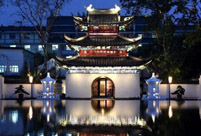 Beautiful night scenery of Nanjing
Beautiful night scenery of Nanjing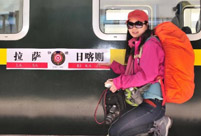 Passenger transport starts on Tibet's new railway
Passenger transport starts on Tibet's new railway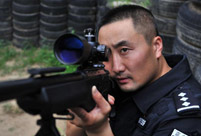 Story of outstanding Beijing swat sniper
Story of outstanding Beijing swat sniper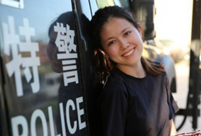 Beautiful policewoman in an anti-terrorism SWAT team
Beautiful policewoman in an anti-terrorism SWAT team Cute photos of little Taoist nuns and monks go viral online
Cute photos of little Taoist nuns and monks go viral online Amphibious armored vehicle unit conducts open sea drill
Amphibious armored vehicle unit conducts open sea drill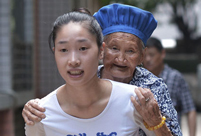 A post-90s girl who takes grandma to work
A post-90s girl who takes grandma to work Beijing policewomen posters become a hit
Beijing policewomen posters become a hit The vanishing folk skills
The vanishing folk skills Intoxicating beauty of Dali, Yunnan province
Intoxicating beauty of Dali, Yunnan province Memorable moments of Ludian earthquake
Memorable moments of Ludian earthquake Bring world together to help elephant
Bring world together to help elephant 'Building Dreams'
'Building Dreams'  Labrang Monastery
Labrang MonasteryDay|Week|Month